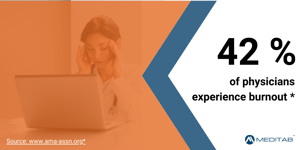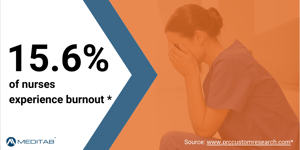Ways to Identify and Cope With Pandemic-Caused Stress
Posted by Paolo Gabriel Demillo
Even without a global health crisis, healthcare professionals are no strangers to stress. However, due to the pandemic, they are now even more susceptible to stress, emotional exhaustion, and burnout. Understanding how best to handle those conditions is not only healthy, it saves lives.
Stress Affects Patient Outcomes
Stress and burnout are two of the most prevalent issues among healthcare providers that often get overlooked. A 2020 study published by the American Medical Association found an overall physician burnout rate of 42%.
 However, it’s not just doctors that experience burnout and stress but nurses as well. According to a 2019 survey, 15.6% of nurses reported feelings of burnout, unfortunately leading them to demonstrate a “diminished capacity to care for themselves and their patients.” That means burnout doesn’t just affect providers’ well-being, it also has adverse effects on patient safety and satisfaction.
However, it’s not just doctors that experience burnout and stress but nurses as well. According to a 2019 survey, 15.6% of nurses reported feelings of burnout, unfortunately leading them to demonstrate a “diminished capacity to care for themselves and their patients.” That means burnout doesn’t just affect providers’ well-being, it also has adverse effects on patient safety and satisfaction.

Although work-related stress is common across every occupation, healthcare professionals, in particular, should be warier of its consequences. Stress determines productivity, and productivity determines patient outcomes. In a job where one error can be the difference between life and death, being stressed or burned out is something healthcare workers can’t afford.
The quality of care that providers deliver is only as good as their mental well-being. With the increased sources of anxiety and stress brought by the coronavirus outbreak, it’s time to pay closer attention to our providers’ mental health and emotional resilience.
How to Cope With Stress During the Pandemic
During these uncertain times, patients and healthcare workers alike need psychological support. To correctly manage the effects of stress on well-being and performance, it’s critical to know first what the early signs of stress are.
The Centers for Disease Control and Prevention (CDC) released a detailed guide on how to recognize and cope with the stresses connected to the COVID-19 pandemic. Some of the early symptoms include:
- Being in denial and getting easily irritated or angered
- Feelings of anxiety, nervousness, and uncertainty
- Lack of motivation
- Feeling tired and burned out
- Constantly feeling sad or depressed
- Insufficient sleep
- Loss of focus or concentration
If these symptoms are left untreated and continue to persist, it can lead to stress-related disorders. Learn how to cope with stress and enhance your emotional resilience with these helpful tips:
- Talk to someone with whom you feel comfortable opening up to about what’s stressing you out.
- Recognize that these are unprecedented times and that you’re not the only one going through a hard time.
- Identify and accept the things that are out of your control.
- Remind yourself about the significance of your work during this crisis and that you are simply doing your best.
- Try to stay consistent with your daily routine before the pandemic.
- Stay physically active as much as possible, and try to do things you enjoy during days off.
- Go on a social media detox and take a break from watching or reading the news.
- Seek professional help if it already involves the misuse of alcohol and drugs.
- Do mindfulness exercises to relax your mind.
We Are Here For You
Modern technology, like EHRs and Telehealth, has made patient care easier and more efficient. But the rising number of COVID-19 cases, along with its challenges, is a primary source of stress for all healthcare professionals.
Whether it’s the practices that are struggling to stay in business, the workers who have either been furloughed or laid-off, or hospital staff members who feel overworked and burned out, the entire healthcare sector today needs support. That’s why we at Meditab are working tirelessly to support our frontline health workers in the best way we know how: through technology and a sincere push to lessen the administrative burden practices are facing.
The tips mentioned above are not a cure-all, but they can help alleviate the worst of what you may be experiencing and make the pandemic a little easier to bear. Just remember, you aren’t alone, and the entire medical community stands with you.
Share this post: on Twitter on Facebook on Google+

